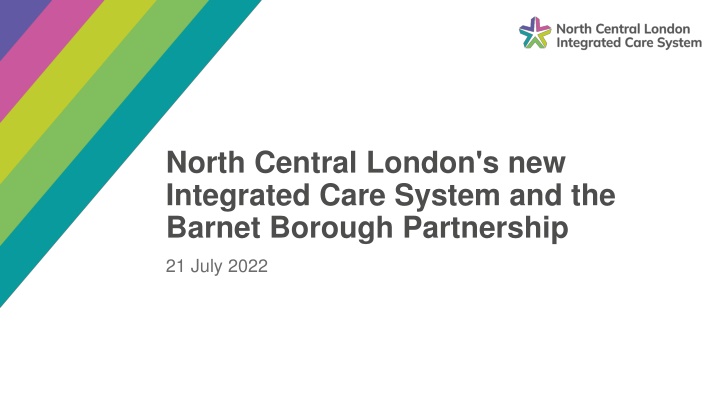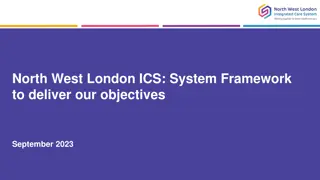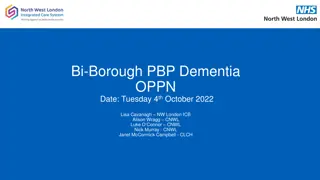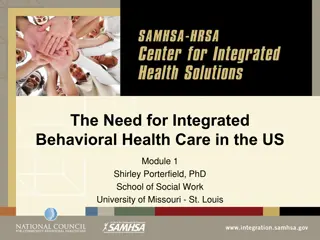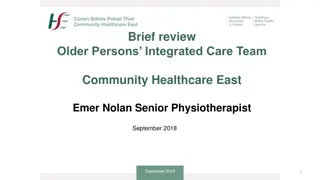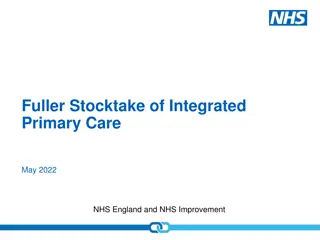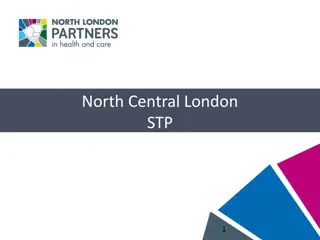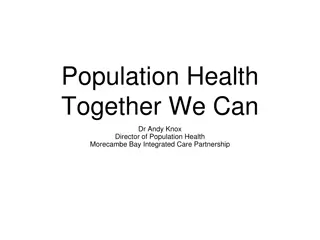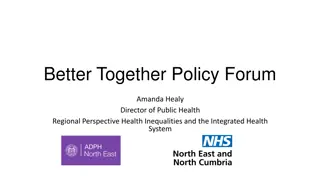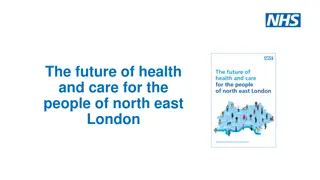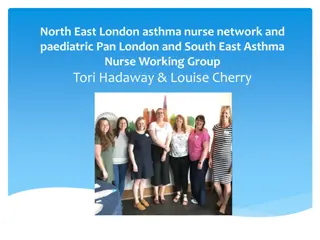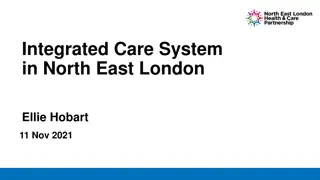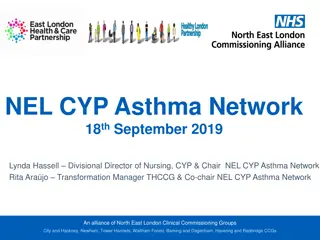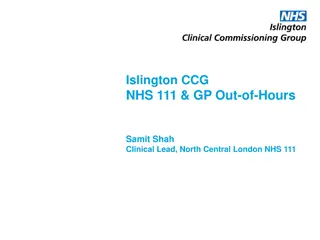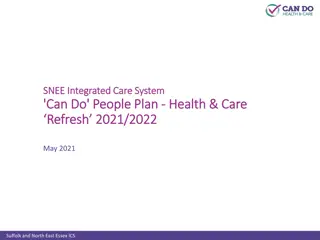North Central London Integrated Care System Overview
The North Central London Integrated Care System (ICS) is a collaborative approach to healthcare planning and delivery across five boroughs. Led by the North Central London Health and Care Partnership, the ICS aims to meet the diverse health, public health, and social care needs of the region through joint efforts of various stakeholders, including NHS trusts, primary care providers, local authorities, and community organizations. The NHS North Central London Integrated Care Board plays a key role in budget allocation and service commissioning, with a focus on integrating health and social care services to improve overall health outcomes.
Download Presentation

Please find below an Image/Link to download the presentation.
The content on the website is provided AS IS for your information and personal use only. It may not be sold, licensed, or shared on other websites without obtaining consent from the author.If you encounter any issues during the download, it is possible that the publisher has removed the file from their server.
You are allowed to download the files provided on this website for personal or commercial use, subject to the condition that they are used lawfully. All files are the property of their respective owners.
The content on the website is provided AS IS for your information and personal use only. It may not be sold, licensed, or shared on other websites without obtaining consent from the author.
E N D
Presentation Transcript
North Central London's new Integrated Care System and the Barnet Borough Partnership 21 July 2022
Todays agenda Topic Speaker Colette Wood, Director of Integration, Barnet borough Nitish Lakhman, Manager, Healthwatch Barnet Time 1 Welcome and introductions 2.30 2.35 2 Integrated Care Board and Integrated Care System and Barnet s Borough Partnership Colette Wood, Director of Integration, Barnet borough 2.35 3.20 3 Conan Cowley, Senior Primary Care Transformation Manager, NCL ICB GP Enhanced Access Service update 3.20 3.40 4 BREAK 3.40 3.50 5 Martin Emery, Senior Engagement Manager, North Central London ICB Resident s Health Panel 3.50 4.05 6 Lizzie Stimpson, Senior Engagement Manager, North Central London ICB Engaging with our communities 4.05 4.20 7 Thank you and close Colette Wood and Nitish Lakhman 4.20 4.30
North Central London Integrated Care Board, Integrated Care System and Barnet s Borough Partnership Colette Wood, Director of Integration
North Central London Integrated Care System (ICS) is the name of the NCL system as a whole. An ICS is a way of working, not an organisation The North Central London Health and Care Partnership, is the Integrated Care Partnership, a joint committee with the councils across the five boroughs. This committee is responsible for the planning to meet wider health, public health and social care needs and will lead the development and implementation of the integrated care strategy. NHS North Central London Integrated Care Board (ICB) allocates NHS budget and commissions services. This is the organisation that NCL CCG staff have transferred to, and is chaired by Mike Cooke, with Frances O Callaghan named Chief Executive. Provider alliances Place/Borough Neighbourhoods Provider collaboratives involve NHS trusts and primary care (including acute, specialist and mental health) working together. UCL Health Alliance incorporates all NHS trusts and primary care in NCL. Place-based partnerships or borough partnerships include ICB members, local authorities, VCSE organisations, NHS trusts, Healthwatch and primary care. Development of Primary care networks will expand to incorporate MDT working across health and social care
NHS North Central London ICB Executive Management Team Chief Executive Officer Frances O Callaghan Chief Finance Officer Phill Wells Chief Medical Officer Dr Jo Sauvage Chief Nursing Officer Chris Caldwell Executive Director of Corporate Affairs Ian Porter Executive Director of Performance and Transformation Richard Dale Executive Director of Places Sarah McDonnell- Davies Chief People Officer Sarah Morgan
Draft principles informing the work of the Integrated Care Board (ICB) It is vital that our ICB builds on existing commitments/programmes and ambitions. Some of the emerging principles informing the work of the ICB are below: Taking a population health approach: We need to continue to develop the way we plan services to take into account the needs of people and communities, acknowledging the wider determinants of health. This will support tackling health inequalities across and within the communities we serve. Evolving how we work with communities: Embedding co-design with partners and communities in planning and designing services, and developing systematic approaches to communications and community engagement. Continued focus on boroughs: Partnership working within boroughs is essential to enable the integration of health and care and to ensure provision of joined up, efficient and accessible services for residents. Learning as a system: We have learnt a lot as a system over the past 18 months, both with our response to the pandemic and our efforts to recover. Capturing this learning across primary care, social care, community, mental health and hospital services will guide our next steps for both individual services and system approaches. Acting as a system to deliver a sustainable health and care system: Providing high quality services enabled by workforce, finance strategy, estates, digital and data.
NCL role has, and continues to change Previously Health service focus e.g. on individual services and individual providers. Organisational focus e.g. planning, delivery, accountability to your organisation only. Now Population health focus e.g. collective responsibility for full range of determinants of health and wellbeing. Facilitative approach across: 1. System / NCL: setting and leading overall strategy, managing collective resources and performance, identifying and sharing best practice to reduce unwarranted variations in care, leading changes that benefit from working at a larger scale such as digital, estates and workforce transformation. 2. Place / Borough: where majority of changes to clinical services will be and ordinated and delivered, population health management used to target interventions to particular groups, providers may work together to join up their services through alliances or more formal contractual arrangements. 3. Neighbourhood PCNs and multidisciplinary teams: deliver coordinated, proactive care and support particularly for groups and individuals with the most complex needs. Contract enforcer e.g. annual contract round and use of contract levers. Decision-maker e.g. CCG decisions & governance and oversight of individual services and actions. Supported by high bureaucracy, low trust processes. Monitoring organisational performance e.g. activity and quality monitored organisation by organisation. System enabler e.g. transparency where there are challenges, shared problem solving, joint approaches. Convener for collective decisions e.g. Integrated Care System focused on forging relationships, facilitation of solutions, shared decision making, low bureaucracy-high trust approaches. Monitoring system performance shared accountability for performance and Integrated Care System role in improvement support.
Outline responsibilities of the ICB The new ICB is a statutory organisation responsible for specific functions that enable it to deliver against the following four core functions: Developing a Plan Allocating Resources Establishing joint working arrangements With partners that embed collaboration as the basis for delivery of joint priorities within the plan. The ICS NHS body may choose to commission jointly with local authorities, including the use of powers to make partnership arrangements under section 75 of the 2006 Act and supported through the integrated care strategy, across the whole system; this may happen at place where that is the relevant local authority footprint. Establishing Governance arrangements To support collective accountability between partner organisations for whole-system delivery and performance, underpinned by the statutory and contractual accountabilities of individual organisations, to ensure the plan is implemented effectively within a system financial envelope set by NHS England and NHS Improvement. To meet the health needs of the population within their area, having regard to the Partnership s Strategy. This will include ensuring NHS services and performance are restored following the pandemic, in line with national operational planning requirements, and Long-Term Plan commitments are met. To deliver the plan across the system, including determining what resources should be available to meet the needs of the population in each place and setting principles for how they should be allocated across services and providers (both revenue and capital). This will require striking the right balance between enabling local decision-making to meet specific needs and securing the benefits of standardisation and scale across larger footprints, especially for more specialist or acute services.
Community involvement and representation Health and Wellbeing Boards (HWBBs) are linked to all borough partnerships Most boroughs have updated their Health and Wellbeing Board Terms of Reference to include a link to the Borough Partnerships Councillors are engaged through the Health and Wellbeing Board although there is increasing interest in direct involvement Local scrutiny committees also regularly request reports on the development of integrated care locally Health and Wellbeing Boards Patient and resident engagement is being undertaken in different forms across borough partnerships All partnerships have their local Healthwatch as members on their partnership groups. Some Healthwatch members lead on specific areas of focus/priorities within the partnership. Borough partnerships have engagement groups Some borough teams also support a patient engagement forum, with resident and Voluntary and community sector representation. Voluntary & community sector (VCSE) organisations play a role in all partnerships NCL VCSE Alliance and NCL Community Partnership Forum established as part of the ICS VCS is represented on all partnership groups across all boroughs. In some, VCS leads on priorities areas (for example Inclusion Barnet) In all others they are plugged into the work and have played an increasingly significant role in delivery of partnership plans (social prescribing, mental health and wellbeing support, delivery of equipment, support to access services, support to comms campaigns such as flu) Patient & resident involvement & engagement Engaging the VCS
Barnet Borough Partnership The Barnet Borough Partnership is a partnership of local health and social care organisations with a common ambition to improve the health and wellbeing of people living in Barnet. The organisations that make up the partnership are: The London Borough of Barnet Barnet Federated GPs Royal Free London NHS Foundation Trust Central London Community Healthcare NHS Trust Barnet, Enfield and Haringey Mental Health Trust Inclusion Barnet Barnet Together (Inclusion Barnet, Young Barnet Foundation and Volunteering Barnet) Voluntary and community sector and faith-based groups in Barnet The Barnet Borough Partnership is responsible for the delivery of care at place the delivery of services tailored to a local level and based on the needs and priorities of residents. The Barnet Borough Partnership will work closely with the North Central London Integrated Care System.
How we are already making a difference Barnet Community Innovation Fund (CIF) Launched in spring 2021, the Barnet Community Innovation Fund comprised of funding from health and social care partners as well as the council and is co-designed with Barnet Together, to support community and Voluntary, Community and Social Enterprise (VCSE) sector innovations. Following the success of the first round of funding awards, a second round was carried out and 31 local community projects received funding and have now received support to deliver innovative projects for Barnet residents The projects span across community-led mental health and wellbeing support, supporting sustainable green spaces, and promoting exercise and wellbeing and supporting families, children and young people, all led by diverse groups within our communities All are receiving support to mobilise their ideas and the impact for our residents and our communities is likely to be grossly beneficial The Barnet Borough Partnership was shortlisted for a Community Involvement award for the Local Government Awards for the Barnet Community Innovation Fund as an example of joint work across the partnership and with voluntary and community sector providers
Frailty Multi-Disciplinary Team (MDT) Multi-disciplinary teams bring together health and care professionals to provide a rounded package of care to local residents based on their needs The Frailty MDT approach provides personalised, proactive and complete care for patients over 65 years who are (or who are at risk of being) moderately and severely frail Royal Free NHS Trust, Central London Community Healthcare NHS Trust, BEH Mental Health Trust, Age UK, Dementia UK working together to help more people be supported to stay well and live well at home for as long as possible A pilot of this frailty MDT, which included the Adult Social Care Prevention and Wellbeing team helped to develop how this approach would work and to determine how well it was working Following stakeholder engagement, The Barnet Frailty Working Group design a finalised model and identified the workforce needed to take this work forward Central London Community Healthcare Trust is recruiting to new roles to enable a new, dedicated pan-Barnet Frailty MDT, including dementia nurses and advisors and frailty nurses/ case managers and therapists, to support MDT meetings, case management and proactive care in the community with continued engagement and support from secondary care and voluntary care sector to ensure a holistic, integrated model. This model will launch across the borough this summer
Children and Young People Paediatric multi-disciplinary team (MDT) sessions have been taking place in Barnet, in collaboration with local Consultant paediatricians from Royal Free NHS Foundation Trust The MDT sessions enabled discussions between secondary care Consultant Paediatricians, early years representatives and primary care GPs This helps for specialist advice and learning to be shared which provides education and support to primary care clinicians to help them to help children in the community rather than sending them to hospital. The Barnet Borough Partnership team is looking to also include mental health support into the MDT as well as wider roles such as social prescribing link workers and supporting further rollout across the borough. Benefits for patients: Reduced anxiety for residents and their families due to better early advice and management from their GP with the potential to cut down on waiting times for advice from secondary care A better patient experience with more personalised care closer to home Appropriate referrals and investigations of patients prior to attendance at hospital appointment where necessary, resulting in fewer hospital follow up appointments and more efficient care. Holistic, multi-disciplinary care
Cardiovascular disease (CVD) This workstream is using data and Population Health Management to reduce inequalities in outcomes for CVD The voluntary care sector, Inclusion Barnet, Public Health and the Barnet Borough Partnership have come together to develop an integrated peer-support approach by employing peers from our communities to educate others on how to help people to prevent CVD and also how to manage their condition The delivery of the peer support model through the Healthy Heart project has seen a number of sessions delivered by Inclusion Barnet initially in the Burnt Oak and Colindale areas Other activities taking place include: looking at cases of hypertension across the borough linking in and launching a Public Health CVD prevention strategy with primary and secondary care initiatives planning to build upon health inequalities peer support bid to co-produce communication and educational materials and help co-design outreach activities
Improving holistic care for adults with dementia and their carers Age UK community-based dementia services - day centre provision, dementia befriending, dementia advisors and a range of other activities MDT discussions to plan, support and signpost residents and their carers, with representation across primary care, VCSE and social care MDT approach and dementia roles to be launched and rolled out as part of the Frailty MDT rollout Dementia Friendly Partnership-Action plan in place working towards accreditation with Alzheimer s UK to become a Dementia Friendly Borough
Mental Health Inequalities The Borough Partnership has sourced funding to support a collaboration with Barnet, Enfield and Haringey Mental Health Trust and 'Art Against Knives (AAK), a local charity supporting young black males to tackle inequalities they experience through peer leadership support and provision of creative spaces and activities This project will tackle inequalities and it is hoped it will support Barnet, Enfield and Haringey Mental Health Trust s integration and community transformation plans It will enable a true co-production approach to the mental health service offer for young black males in our community It will also support AAK in delivering their creative spaces and early intervention support, enabling new peer support roles in the community and to undertake an effective community led co-production activity to address the mental health inequalities of young black men in Barnet and feedback to system partners to inform service delivery
Enhanced Access to General Practice Conan Cowley, Senior Primary Care Transformation Manager
Introduction We want to provide an update on upcoming changes to enhanced access to general practice. Enhanced access is the provision of appointments outside of a GP practice s core hours of 8am to 6.30pm (e.g. evenings and weekends). From October 2022, Primary Care Networks (groups of local GP practices working together) will take over the responsibility for providing enhanced access for the patients in their area This is a national change. A national specification, released at the end of March 2022, describes the enhanced access service that must be provided by Primary Care Networks (PCNs) There are some differences between the national specification and what s currently provided for our patients in North Central London (NCL which includes the boroughs of: Islington, Barnet, Camden, Enfield and Haringey) However, we are committed to making sure that there will be no reduction in the overall amount of primary care appointments available for people across the week and on bank holidays as a result of these changes. What may change is the way that you access these appointments for example, how you book them and where you might go to be seen
How is enhanced access currently provided across North Central London? There are currently two forms of enhanced access provision in general practice: Extended Access Hubs (weekday evenings 6.30-8pm, and weekends and bank holidays 8am-8pm): The ICB currently commissions a number of extended access GP hubs in each borough, which can be accessed by any registered patient in that borough. They offer both pre-bookable and on the day appointments, and NHS 111 can also book patients in. There are some differences by borough reflecting different patterns of demand, use and investment. London is the only region to consistently offer Sunday provision. Extended Hours access: GP practices receive direct funding to provide extended hours to expand their own practice s core opening hours and provide additional early morning, evening and weekend sessions. The timing of these sessions is determined by the practice and must include emergency, same day and pre-bookable appointments.
Why are things changing? From 1 October 2022, national funding for these two forms of access will be combined and given to Primary Care Networks (PCNs) to provide an enhanced access service for their patients. PCNs are groups of GP practices working together with each other and with other partners - to deliver nationally set services (we have 32 PCNs in North Central London). A national specification, released at the end of March, describes the enhanced access service that must be provided by PCNs. PCNs need to submit plans to show how they will deliver this access for patients by 31 July 2022 (draft plans) and 31 August (final plans). PCNs are required to show that the plans that they develop are based on engagement with patients, are responsive to known patient views, and reflect the patient need in their area. The ICB is responsible for assuring the PCN plans and ensuring that they form part of a joined up approach across North Central London.
What is in the national specification that s similar to what we have now? Capacity: the overall number of hours that need to be provided for patients is similar to what s provided now. Hub locations: the locations for face to face appointments need to be convenient for the PCN s patients to access and, as a minimum, equivalent to the current number of hub sites. Type of appointment: PCNs will need to provide a mixture of face-to-face and remote (telephone, video, online) appointments and the ability to pre-book appointments in advance, as well as booking on the same day. Staff you ll see: appointments will continue to be available with GPs and Practice Nurses in addition to other roles.
Whats in the national specification that s different to what we have now? Hours of operation: The specification does not include any requirement for services to be provided on a Saturday evening between 5-8pm, or on Sundays or Bank Holidays. This would be a change for patients in London (and NCL). Even though the overall quantity of provision would be similar to what patients have now, the specification asks that it is provided Monday Saturday only. More focus on appointments that can be booked in advance: The specification has more focus on making sure pre-bookable appointments are available for patients this would help patients to access appointments that they can book in advance for planned care in the enhanced access service. By planned care , we mean appointments for things like regular monitoring of a patient s long term condition, immunisations or screening for example. There is less focus in the specification on providing same-day care - and there s likely to be a reduction in the availability of appointments for NHS 111 to book into. Different service models: Because we have 32 PCNs, there might be an increase in the number of different enhanced access services available in North Central London, compared with what we have now (we have five borough-based models). There is also no requirement in the specification for patients to be able to access hubs outside of their PCN area (at the moment patients can go to any hub in their borough). Telephony and IT and how these work together between the GP practices within the PCN may improve. The specification asks PCNs to make sure that all practices and the PCN have the ability to book into/cancel appointments, make referrals/request tests, view/update patients records.
What changes are likely in North Central London? Enhanced access services are currently available for all our residents in North Central London. You may already have used these services either at your own practice or at another practice or healthcare site. What s changing from October is that Primary Care Networks will become responsible for providing most of these enhanced access appointments for their patients. In North Central London, there will be no reduction in the overall amount of primary care appointments available for people across the week and on bank holidays as a result of these changes. However, there may be changes in the way that you access these appointments for example, how you book them and where you might go to be seen. We want to know what s important to you, and your experience of using these services previously. This will help our Primary Care Networks to make their plans. Our Primary Care Networks will also be talking to their patient groups over the coming weeks, and many will be doing a survey to help them make their plans.
Timeline The timeframes for these changes have been set nationally and include: National specification for what PCNs need to deliver 31 March 2022 PCNs to submit draft proposals for how they will deliver enhanced access for their patients 31 July 2022. These plans will be informed by engagement with patients. PCNs and ICB to agree final plans - 31 August 2022 PCNs to start delivering the new service 1 October 2022 PCN plans will need to set out a number of things including: how their plans have been informed by engagement, what services will be provided, the mix of appointment types available and where the location for face-to-face appointments will be. PCNs will also describe how they will communicate with patients and the public about the enhanced access service how it s accessed, what is available and when through multiple routes. The ICB is responsible for assuring the PCN plans and making sure that they form part of a joined up approach across North Central London.
Header title 27
Header title 28
